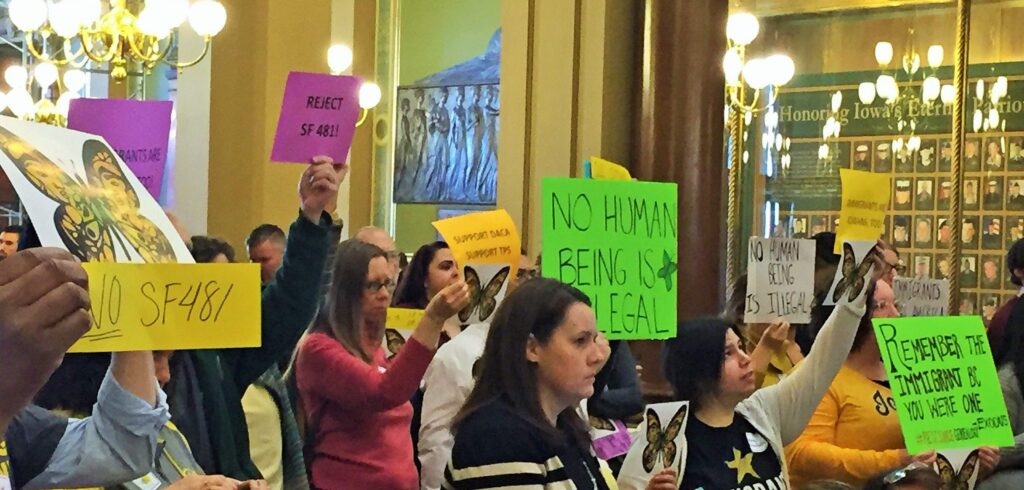Iowa House Republicans are behaving like children who have something to hide. Because they do.
Last week, the Iowa House Public Safety Committee took up House File 481, the misnamed “sanctuary city” bill.
Not only did members choose one of the smallest rooms in the Statehouse for the meeting, but Chairman Clel Baudler, R-Greenfield, reserved nearly all the seats for GOP clerks. As Gazette political reporter James Q. Lynch noted in his article, such staffers do not typically attend committee meetings.
Baudler said it was an attempt to maintain order as lawmakers again discussed the possibility of withholding untold swathes of state funding from local governments that do not go above and beyond what federal immigration law requires.
Although GOP lawmakers want to frame this bill as a law-and-order measure made necessary by elitist liberals in Iowa City and Des Moines, there is a reason why law enforcement agencies river-to-river have publicly and repeatedly voiced opposition.
The bill sets new, expensive, ineffective and likely unconstitutional requirements on local police forces. Agencies that stand with the rule of law will be punished by removal of state funding.
Agencies that follow mandates in the bill open themselves up to increased expenses and legal liability, none of which will be reimbursed by the state or federal government.
So, for law enforcement — and taxpayers — this is a classic damned if you do and damned if you don’t scenario.
SANCTUARY CITIES
For all the buzz given to term “sanctuary city,” there is no specific legal or common definition.
A state or local government that adopts formal or informal policies to limit its involvement in federal immigration enforcement is often labeled a “sanctuary,” even if the jurisdiction has shunned the term.
IMMIGRATION LAW
Regulating immigration is primarily the purview of the federal government. State and local law enforcement have their own problems, and don’t generally enforce federal immigration law. But cooperation between federal enforcement agencies and local jurisdictions is an entirely different matter.
This is because, in response to some cities’ attempt in the 1980s to restrict cooperation, Congress placed language in the Illegal Immigration Reform and Immigrant Responsibility Act and the Personal Responsibility and Work Opportunity Reconciliation Act to prohibit state and local policies that bar information sharing.
Federal mandates do not, however, extend to immigration detainers issued by Immigration and Customs Enforcement.
DETAINER TROUBLES
The Iowa bill before lawmakers mirrors legislation introduced by Republicans around the country in that it focuses on detainers, or notices issued by ICE to other law enforcement agencies that it intends to assume custody of a person. Once a notice is issued, ICE wants notification at least 48 hours before a person is released from local custody and/or wants the local agency to hold the person for up to 48 workweek hours after scheduled release.
But, as supported by four (of several) recent court decisions, the governments’s own interpretation of the law and federal regulations, detainers are requests.
In Galarza v. Szalcyzk the U.S. Court of Appeals for the 3rd Circuit held that states and local agencies were not required to honor them.
In Morales v. Chadbourne and Miranda-Olivares v. Clackamas County, the courts found holding a person beyond scheduled release constitutes an arrest under the Fourth Amendment, which requires ICE to have probable cause to issue a detainer. This was further defined in the Northern District of Illinois, which found detainers alone do not give ICE authority to arrest; a warrant is required.
ICE has responded by developing two separate administrative warrant forms, which are attached to detainers — an administrative warrant for arrest and for removal/deportation. But these forms, signed by immigration officers, are not a judicial warrant, which is signed by a judge.
Courts have not yet ruled on whether administrative warrants meet the standards of the Fourth Amendment.
A federal court in Texas blocked portions of a state law that also forced local agencies to honor ICE detainers. That court found probable cause assessments required by ICE and local officers are different; the case has been appealed to the Fifth Circuit.
TAXPAYER BURDEN
The bill before Iowa lawmakers is all sticks and no carrots. That is, if a local agency doesn’t agree to the demands, the state will withhold funding. There is no reimbursement provision for money spent on jail services, much less any litigation that results.
A similar concept was written into an executive order by President Donald Trump. A federal judge granted an injunction, blocking the administration’s efforts to withhold federal funds.
When the Legislative Services Agency issued a required fiscal review of the Iowa bill, researchers could not determine an exact cost.
They also didn’t attempt to name every funding stream at risk, but speculated the list included monies from the Road Use Tax Fund, property tax backfill, tuition replacement, flood mitigation projects, community college funding, economic development grants and more.
Law enforcement agencies were put in this position before, during the first wave of the Secure Communities program, and it didn’t turn out well for them or the public.
Roughly 3,600 American citizens were mistakenly held, sometimes for months. Nearly 93 percent of those arrested were Latino, although that demographic represents roughly 75 percent of the undocumented population. Most held under the program were jailed without bail, without access to a lawyer and without a court hearing — and most of those deported (79 percent) had no criminal record and had been picked up, but never convicted, on low-level offenses.
Local departments cooperating beyond what the law requires were perceived as extensions of ICE. Years of community policing efforts evaporated as trust was eroded and neighborhoods became less safe.
Federal law draws a clear line between its immigration enforcement efforts and the duties of local police departments for a reason. Iowa lawmakers who vote to cross that line will find no sanctuary.
This column by Lynda Waddington originally published in The Gazette on Sunday, March 11, 2018. Photo Credit: Rod Boshart/The Gazette

